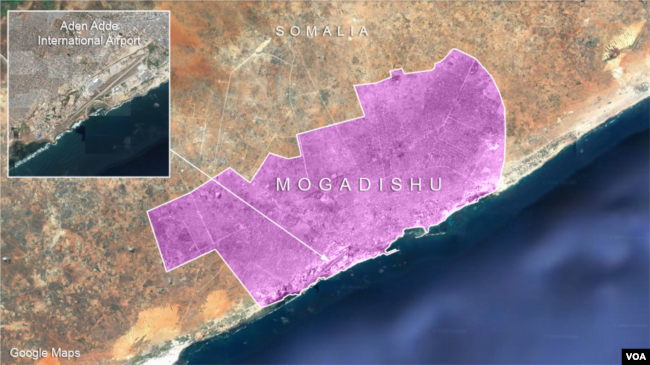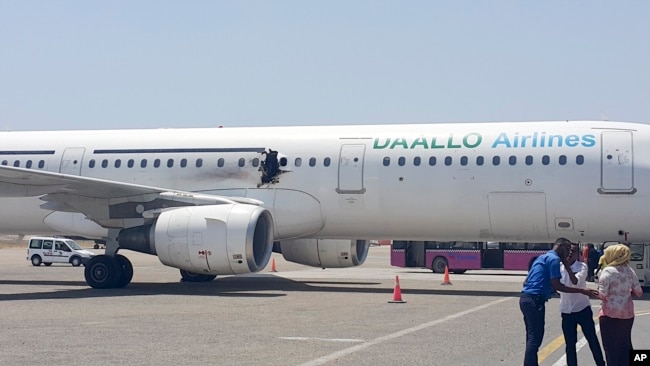Officials: Mogadishu Flights Safe from Laptop Attacks
The United States and Britain banned passengers last month on several Middle Eastern airlines from carrying laptop and tablet computers onto the plane. Officials cited airline safety concerns as the reason, and pointed specifically to a February 2016 attack on a flight of the Somali airline Daallo, in which a passenger set off a bomb concealed in a laptop, killing himself.
Now, the Somali government said it has taken specific steps to address security at Mogadishu’s international airport and has no plans to follow the U.S. and British example and ban electronics from outgoing flights.
Brigadier General Abdi Ashkir Jama, the general manager of Mogadishu’s Aden Adde International Airport, tells VOA Somali that his staff has developed a rigorous security system.
“Whoever is traveling or entering the airport goes through searches, three scans, sniffer dogs; laptops must be turned on,” he said. “For international flights like Turkish Airlines, it has its own security gate where further security checks are made after going through all the above procedures.”

Aden Adde International Airport, Mogadishu, Somalia
Jama and his staff also oversaw changes to the procedures of airport security staff and scanners, and they took steps to improve their skills, according to Jama.
He expressed confidence that outgoing flights will be safe. “Unless they come with up with new technical advances about explosives that we don’t know of, they cannot smuggle explosives into the planes,” he said.
“They” in this case refers to members of the militant group al-Shabab, which claimed responsibility for the attack on Daallo flight 159.
The explosion occurred shortly after takeoff from the Mogadishu airport, punching a hole in the plane’s fuselage next to the fuel tank. Eighty of the 81 people on board the flight survived.
Officials immediately identified the only missing person from the plane, Abdullahi Abdisalam Borleh, as the person carrying the laptop that contained the bomb. Borleh was sucked through the hole created by the blast.
An investigation into the bombing found that the plotters, led by suspected mastermind Abdullahi Arays Hashi, smuggled the laptop into the airport twice before the explosion.
Officials say that on Feb. 1, 2016, airport security official Abdiweli Maow sneaked it through a gate reserved for employees. He then handed it over to the would-be bomber, Borleh, but Borleh’s flight that day was canceled.
Maow and Borleh made a second attempt on the following day. This time, the laptop went through security scans, but nothing was detected.
Colonel Hassan Ali Nur Shute is chief prosecutor of the military court that prosecuted the suspects. He blames lack of skills by airport security staffers and the fact that the technique used by al-Shabab was new to them.
“They fitted the explosives in the laptop with sophistication,” he said. “It was difficult for the staff to detect; they have not seen that kind of technique used before.”
Shute says he knows that travelers often need in-flight access to their electronics, and passengers now can have confidence in security procedures.
“If you are a businessman, you need to work during the flight,” he said. “I travel and I need to have my laptop to work, it will be uncomfortable if it’s taken away from me.”
Online passport suspension
Another measure taken by the Somali government after the attack was to shut down online passport services.
The flight 159 bomber, Borleh, applied for his passport online. A staffer at the Immigration and National Directorate helped process the passport on his behalf.

FILE – In this photo taken Feb. 2, 2016, a hole is seen in a plane operated by Daallo Airlines as it sits on the runway of the airport in Mogadishu, Somalia.
“At this moment under my supervision, that service is shut down,” said Directorate official Colonel Mohamed Aden Kofi. “We have also stopped issuing passports to anyone who does not appear in person.”
Kofi says applicants deemed suspicious are sent to the security agencies for investigation and are required to bring a letter from their traditional clan elder or chief of their neighborhood stating that they have no links with al-Shabab.
He said authorities also have new document-scanning equipment to protect against forgery.
Somalia introduced a new passport with a computer chip more than 10 years ago. So far, about 2.7 million passports have been issued, equal to a quarter of Somalia’s population.
Business factor
Somali security officials say business interests were likely a factor in the Daallo Airlines attack. Two top security officials who investigated the incident told VOA Somali that individuals in the airline industry “probably pitched the idea to al-Shabab to target Turkish Airlines.”
The laptop bomb exploded on a Daallo Airlines flight, but the original target was Turkish Airlines, officials confirmed. The bomber was supposed to connect to Turkish Airlines after flying to Djibouti, but the second flight was canceled.
His ticket was bought by a travel office based in Luanda, Angola, where Hashi had business connections.
Al-Shabab has its own reasons for attacking Turkish interests. The group’s emir, Abu Ubaydah, has said the airline is being used to expand Western influence in the Muslim world. Turkey also gives the Somali government financial and diplomatic support.
One of the lingering concerns for the Somali government is that the chief planner, Hashi, remains at large. He was sentenced to life in prison in absentia for the bombing. His conspirator, Abdiweli Maow, received the same sentence and was jailed after waiving a chance to appeal his conviction.
Somali officials say Hashi, who has run a clothing business and travel agency in Mogadishu, has helped to finance al-Shabab’s operations for a long time.
Officials believe Hashi was al-Shabab’s main facilitator in Mogadishu, though not the one who made the bomb.
“We believe the bomb was made by al-Shabab’s explosives wing led by a senior level individual,” a security official with the National Intelligence and Security Agency said. “They are highly sophisticated.”